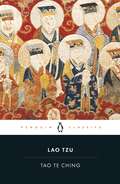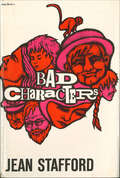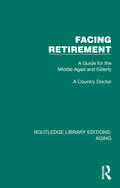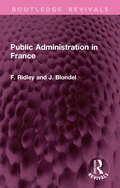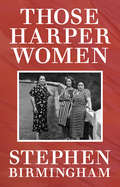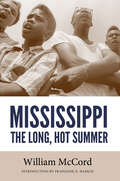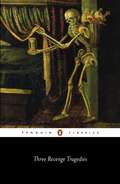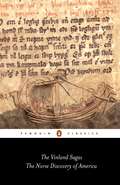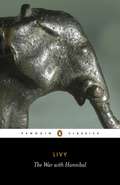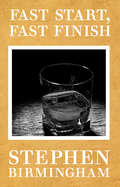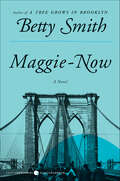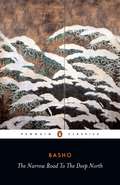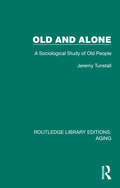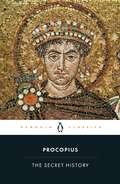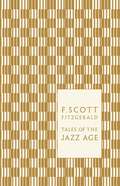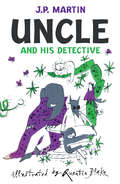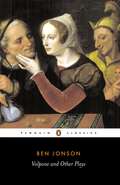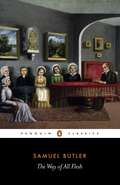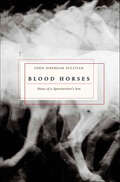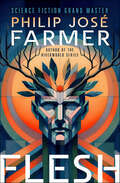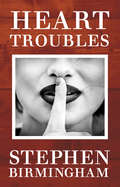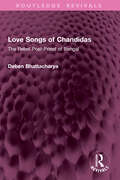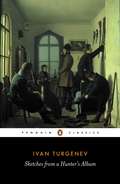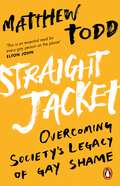- Table View
- List View
Tao Te Ching
by Lao Tzu'Have little thought of self and as few desires as possible'Whether or not Lao Tzu was a historical figure is uncertain, but the wisdom gathered under his name in the fourth century BC is central to the understanding and practice of Taoism. One of the three great religions of China, Taoism is based upon a concept of the Tao, or Way, as the universal power through which all life flows. The Tao Te Ching offers a practical model by which both the individual and society can embody this belief, encouraging modesty and self-restraint as the true path to a harmonious and balanced existence.Translated with an Introduction by D. C. Lau
Bad Characters: Stories
by Jean StaffordThis book displays at their height the wit, sensibility and psychological penetration that distinguish Miss Stafford's work. There are nine stories and a novella. They range in mood from the title story, a comic portrait of a resourceful child-criminal named Lottie Jump, to "The End of a Career," an elegiac and ironic tale of the declining years of a great beauty. In "A Reasonable Facsimile" Dr. Bohrmann, a retired professor philosophy, is unexpectedly rescued from an aggressively boring young house guest. "Cops and Robbers" is a chilling story of childhood horror and lovelessness that revolves around a father's trip to the barber with his five-year-old daughter.Several of the stories have as their common setting Miss Stafford's fiction town of Adams, Colorado—including an amusing saga of a girl's frustrated attempts to find a quiet spot to read ("A Reading Problem"), and two stories of failure ("In the Zoo") and success ("The Liberation") in the effort to escape from one's family. "Caveat Emptor" is a satire on the academic life and sub-life at the Alma Hettrick College for Girls; and in "The Captain's Gift" the sheltered and lavender-scented existence of old Mrs. Ramsey is violated by the reality of war.The major piece in Bad Characters is "A Winter's Tale," a haunting and evocative novella set in Heidelberg just before the outbreak of the war. It is dominated by the diabolic character of Frau Professor Persis Galt. This portrait of a former Bostonian who poses as an excessively devout convert is one of Miss Stafford's most brilliant fictional creations.This collection by Jean Stafford will be warmly welcomed by the many and devoted admirers of her novels and stories. To new readers the work of one of the best writers of our time will come as a joyful discovery.
Facing Retirement: A Guide for the Middle Aged and Elderly (Routledge Library Editions: Aging)
by A Country DoctorOriginally published in 1960 and revised in 1964 the blurb for Facing Retirement read:“Mature men and women are not afraid of advancing years. More and more seek to prepare themselves for retirement so that they may then find all the happiness they can.This phase of life is interesting to a widening circle, and in writing this book it was the author’s aim to discuss readably, simply, and from his experience with his patients, most relevant aspects of these later years. It was a pioneer in its approach: any similar books which may follow, if they help to lessen the burden of the elderly and aged which has to be sustained by the younger generations, must be of the highest importance not only to individuals but to the nation.For nearly thirty years the author of this book has had the medical care of over 2,000 people of all ages in a cluster of villages and hamlets at the foot of the Cotswold Hills. He has been chairman or president of the County Association for the Care of old People since its inception in 1952.”Today it can be read and enjoyed in its historical context.
Public Administration in France (Routledge Revivals)
by F. F. Ridley J. BlondelOriginally published in 1964, this book was an important addition to the growing field of comparative government and administration. This book covers the organisation of the French cabinet, the structure and functions of government departments and of local authorities, the civil service, the police, the judiciary and public enterprise. There are also chapters on economic planning, the administration of social services and of the educational system. The book explains the spirit as well as the mechanism of the French administrative system, the principles that underly it and the wider background against which it is set
Those Harper Women
by Stephen BirminghamFour generations of women grapple with the gilded cage of their family dynasty in this #1 New York Times–bestselling author&’s &“big, bustling novel&” (The New York Times). Meredith Harper made millions in rum before Prohibition ruined the market. When he died, he left behind an estate of such vast wealth that his descendants were set for life—but what sort of life would it be? In Those Harper Women, Stephen Birmingham presents a fictional group portrait of women who pass down both fortunes and misfortunes, who want for nothing save happiness. Across generations, the Harper women seek joy, self-fulfillment, or mere escape from the trappings of their privilege. But through trips to Europe and the Caribbean, through marriage and divorce, the women find themselves returning time and again to the looming shadow of Meredith and his money.
Mississippi: The Long, Hot Summer (Civil Rights in Mississippi Series)
by William McCordIn 1964, sociologist William McCord, long interested in movements for social change in the United States, began a study of Mississippi's Freedom Summer. Stanford University, where McCord taught, had been the site of recruiting efforts for student volunteers for the Freedom Summer project by such activists as Robert Moses and Allard Lowenstein. Described by his wife as “an old-fashioned liberal,” McCord believed that he should both examine and participate in events in Mississippi. He accompanied student workers and black Mississippians to courthouses and Freedom Houses, and he attracted police attention as he studied the mechanisms of white supremacy and the black nonviolent campaign against racial segregation. Published in 1965 by W. W. Norton, his book, Mississippi: The Long, Hot Summer, is one of the first examinations of the events of 1964 by a scholar. It provides a compelling, detailed account of Mississippi people and places, including the thousands of student workers who found in the state both opportunities and severe challenges. McCord's work sought to communicate to a broad audience the depth of repression in Mississippi. Here was evidence of the need for federal action to address what he recognized as both national and southern failures to secure civil rights for black Americans. His field work and activism in Mississippi offered a perspective that few other academics or other white Americans had shared. Historian Françoise N. Hamlin provides a substantial introduction that sets McCord's work within the context of other narratives of Freedom Summer and explores McCord's broader career that combined distinguished scholarship with social activism.
Three Revenge Tragedies
by Cyril Tourneur John Webster Thomas MiddletonFollowing the end of Queen Elizabeth's reign in the early seventeenth century, the new court of King James was beset by political instability and moral corruption. This atmosphere provided fertile ground for the dramatists of the age, whose plays explore the ways in which social decadence and the abuse of power breed resentment and lead inexorably to violence and bloody retribution. In Tourneur's The Revenger's Tragedy, the debauched son of an Italian Duke attempts to rape the virtuous Gloriana - a veiled reference to Elizabeth I. Webster's The White Devil depicts a sinister world of intrigue and murderous infidelity, while The Changeling, perhaps Middleton's supreme achievement, powerfully portrays a woman bringing about her own unwitting destruction. All three are masterpieces of brooding intensity, dominated by images of decay, disillusionment and death.
The Vinland Sagas: The Norse Discovery of America
by Magnus Magnusson Hermann PalssonOne of the most arresting stories in the history of exploration, these two Icelandic sagas tell of the discovery of America by Norsemen five centuries before Christopher Columbus. Together, the direct, forceful twelfth-century Graenlendinga Saga and the more polished and scholarly Eirik's Saga, written some hundred years later, recount how Eirik the Red founded an Icelandic colony in Greenland and how his son, Leif the Lucky, later sailed south to explore - and if possible exploit - the chance discovery by Bjarni Herjolfsson of an unknown land. In spare and vigorous prose they record Europe's first surprise glimpse of the eastern shores of the North American continent and the natives who inhabited them.
The War with Hannibal: The History of Rome from its Foundation Books 21-30
by LivyIn The War with Hannibal, Livy (59 BC-AD 17) chronicles the events of the Second Punic War between Rome and Carthage, until the Battle of Zama in 202 BC. He vividly recreates the immense armies of Hannibal, complete with elephants, crossing the Alps; the panic as they approached the gates of Rome; and the decimation of the Roman army at the Battle of Lake Trasimene. Yet it is also the clash of personalities that fascinates Livy, from great debates in the Senate to the historic meeting between Scipio and Hannibal before the decisive battle. Livy never hesitates to introduce both intense drama and moral lessons into his work, and here he brings a turbulent episode in history powerfully to life.
Another Spring
by Loula Grace ErdmanLong lines of refugees wind their way through all of recorded history. Today, numbered in the millions, the dispossessed wander across most of the countries of the earth. Here is an eloquent and dramatic novel about some exiles of the American past, victims of Order Number Eleven. On a hot August day in 1863, the military order was posted in four western counties of Missouri, banishing by Federal edict all inhabitants, sympathizers of the Union as well as the Confederacy. Harried by roaming hostile bands, their homes burned, thousands fled the proscribed area. Taking only the barest necessities, the Weatherlys and the Nichols joined the crowds jamming the dusty roads. They were rich landowners and, despite the conflict in loyalties, friends. The bond between them was strengthened by the engagement of Richard Nichols and the Weatherlys’ niece Betsey. And then there were the Carroways, neighbors, too, but strangers, separated by a gulf of caste and privilege. Yet it was Lura Carroway’s brother Pete who was to play a decisive role in the future of the little group. The troubled days of the exodus began -- of being rejected and driven on, of living off the land, of hunger and numbing fatigue. Crises and danger from secret enemies lay ahead of them. Life itself would depend on their being able to forget their old ways, on their ability to change. But the journey into fear would be a journey of self-discovery, of tragedy balanced by hope. And for some of them, love would come. It would not have the romantic background of balls and parties that young Susan Nichols had been brought up to expect, but against the shadows it would cast a stronger light. Miss Erdman writes with authority of a period and a place that she knows well. Her novel Many A Voyage was about Kansas during that dark and bloody era of warfare between the two states. Now, in Another Spring she has told a compelling story about a group of exiles bound together in a struggle for survival--a story that is as timely as the accounts of the refugees of today.
Fast Start, Fast Finish
by Stephen BirminghamA family man risks everything to pursue his artistic dreams, in this novel of marriage, betrayal, and suburban malaise by the author of The Auerbach Will. California art director Charlie Lord has all the makings of a surefire winner. But despite his good looks, wit, and sophistication, his track record shows a series of blazing starts followed by fast, ego-crushing finishes. His marriage to Nancy, complete with three almost grown-up children and an elegant house in an exclusive suburb, gave him all the trappings of happiness. Still, none of these things can satisfy Charlie&’s dreams of success on a grand scale. Now he&’s off and running once again—taking his family across the country to New York, where he hopes to further his career as an artist. But Charlie soon finds himself submerged in a sea of troubles . . . and a fevered love affair that threatens to destroy his life.
Maggie-Now: A Novel
by Betty SmithBetty Smith, the beloved author of A Tree Grows in Brooklyn, weaves a riveting modern myth out of the experiences of her own life in this rediscovered classic.In Brooklyn's unforgiving urban jungle, Maggie Moore is torn between answering her own needs and catering to the desirous men who dominate her life. Confronted by her quarrelsome Irish immigrant father, the feckless lover who may become her husband, and others, Maggie must learn to navigate a cycle of loss, separation, and hope as she forges her own path toward happiness.With characteristic warmth, compelling insight, and easy, conversational prose, Maggie-Now poignantly illuminates one woman's struggles and successes as she grapples with timeless questions of desire, duty, self-sacrifice, and the quest for fulfillment. Maggie-Now is an unforgettable masterpiece from one of the twentieth century's greatest talents.
The Narrow Road to the Deep North and Other Travel Sketches
by Matsuo Basho'It was with aweThat I beheldFresh leaves, green leaves,Bright in the sun'When the Japanese haiku master Basho composed The Narrow Road to the Deep North, he was an ardent student of Zen Buddhism, setting off on a series of travels designed to strip away the trappings of the material world and bring spiritual enlightenment. He writes of the seasons changing, the smell of the rain, the brightness of the moon and the beauty of the waterfall, through which he sensed the mysteries of the universe. These writings not only chronicle Basho's travels, but they also capture his vision of eternity in the transient world around him.Translated with an Introduction by Nobuyuki Yuasa
Old and Alone: A Sociological Study of Old People (Routledge Library Editions: Aging)
by Jeremy TunstallWhat is it like to be an isolated old widow, living alone on the bare old-age pension? In the 1960s, the question had become a standard refrain. Originally published in 1966, this was the first full-length study by a sociologist of isolation in old age.Although the majority of old people were in no sense a problem group at the time, a substantial minority of the elderly were ‘alone’ in one or more ways. About 1.3 million people aged sixty-five and over in Britain lived alone; a large number admitted to feeling lonely, at least sometime. About a million were actually socially isolated in terms of low level and frequency of social contact. Mr Tunstall also uses a fourth category of aloneness – namely anomie (as developed by Durkheim, Merton, and Srole).This report uses careful and statistical analysis of the four types of aloneness and of specially affected groups such as the single, the recently widowed, and the housebound. But it also includes details of interviews with ten highly individual old people from suburban Harrow, booming Northampton, industrial revolution Oldham, and rural South Norfolk.The book contains a discussion of the problem of personality in isolation, and a commentary on the inadequacies of social theory about old age. Finally, the concluding chapter suggests a wide variety of policy measures which might help to alleviate social isolation in old age.
The Secret History
by ProcopiusA trusted member of the Byzantine establishment, Procopius was the Empire's official chronicler, and his History of the Wars of Justinian proclaimed the strength and wisdom of the Emperor's reign. Yet all the while the dutiful scribe was working on a very different - and dangerous - history to be published only once its author was safely in his grave. The Secret History portrays the 'great lawgiver' Justinian as a rampant king of corruption and tyranny, the Empress Theodora as a sorceress and whore, and the brilliant general Belisarius as the pliable dupe of his scheming wife Antonina. Magnificently hyperbolic and highly opinionated, The Secret History is a work of explosive energy, depicting holy Byzantium as a hell of murder and misrule.
Tales of the Jazz Age (Collins Classics Ser. #Vol. 1)
by F. Scott Fitzgerald'The Curious Case of Benjamin Button' sees a baby born in 1860 begin life as an old man and then age backwards. F. Scott Fitzgerald hinted at this kind of inversion when he called his era 'a generation grown up to find all Gods dead, all wars fought, all faiths in man shaken'. Perhaps nowhere in American fiction has this 'Lost Generation' been more vividly preserved than in Fitzgerald's short fiction. Spanning the early twentieth-century American landscape, this collection captures, with Fitzgerald's signature blend of enchantment and disillusionment, America during the Jazz Age.
Uncle And His Detective
by J. P. Martin Quentin BlakeIt begins with the arrival not of a detective, but of disaster: Badfort is for sale, but when Uncle decides to buy it, demolish it, and build a pleasantly appointed park on the site, he is forestalled. Beaver Hateman has sold it cheaply to someone on the condition that he, Hateman, is allowed to stay on as a paying guest. Forgetting that the man who has bought Badfort is certain to regret the "bargain", Uncle tries to console himself by continuing his never-ending exploration of Homeward. He soon discovers the mysterious Crack House - lair of a vicious and horribly squawking creature, half-bat, half-bird, called Batty - where there are rumours of buried treasure. Uncle is in need of a detective . . .
Volpone and Other Plays
by Ben JonsonThe three plays collected in this volume depict the faults, errors and foibles of ordinary people with exuberant humour, savage satire and acute observations. Volpone portrays a rich Venetian who pretends to be dying so that his despised acquaintances will flock to his bedside with extravagant gifts in hope of an inheritance. The Alchemist also deals with greed and gullibility, as a rascally trio of confidence tricksters, claiming to have the legendary Philosopher's Stone, fool a series of victims who are hoping to make some easy money. And in a wonderfully energetic portrait of Jacobean life, Bartholomew Fair shows a diverse group of Londoners sampling the delights and temptations of the Fair - and the traders, prostitutes and cutpurses who set out to exploit them.
The Way of All Flesh
by Samuel Butler'I am the enfant terrible of literature and science. If I cannot, and I know I cannot, get the literary and scientific big-wigs to give me a shilling, I can, and I know I can, heave bricks into the middle of them.' With The Way of All Flesh, Samuel Butler threw a subversive brick at the smug face of Victorian domesticity. Published in 1903, a year after Butler's death, the novel is a thinly disguised account of his own childhood and youth 'in the bosom of a Christian family'. With irony, wit and sometimes rancour, he savaged contemporary values and beliefs, turning inside-out the conventional novel of a family's life through several generations.
Blood Horses: Notes of a Sportswriter's Son
by John Jeremiah SullivanFrom the award-wining author of Pulphead, John Jeremiah Sullivan's first book, Blood Horses, combines personal reflections about his father and an in-depth look at the history and culture of Thoroughbred racehorses.Winner of a 2004 Whiting Writers' Award"Sullivan has found the transcendent in the horse."--Sports IllustratedOne evening late in his life, veteran sportswriter Mike Sullivan was asked by his son what he remembered best from his three decades in the press box. The answer came as a surprise. "I was at Secretariat's Derby, in '73. That was ... just beauty, you know?"John Jeremiah Sullivan didn't know, not really--but he spent two years finding out, journeying from prehistoric caves to the Kentucky Derby in pursuit of what Edwin Muir called "our long-lost archaic companionship" with the horse. The result--winner of a National Magazine Award and named a Book of the Year by The Economist magazine--is an unprecedented look at Equus caballus, incorporating elements of memoir, reportage, and the picture gallery.In the words of the New York Review of Books, Blood Horses "reads like Moby-Dick as edited by F. Scott Fitzgerald . . . Sullivan is an original and greatly gifted writer."
Flesh
by Philip José FarmerA starship crew returns to a primitive, post-apocalyptic—and deadly—Earth in this classic adventure by a Science Fiction Grand Master. After eight centuries of exploring the stars, Space Capt. Peter Stagg and his starship crew return to Earth to find a scorched planet with little plant life remaining. Civilization has changed drastically with technology reverted to the Stone Age and culture centered on a pagan fertility cult. Stagg soon finds himself initiated into the Elk fraternity. They graft antlers to his head, crowning him the new &“Sunhero.&” He is then sent on a six-month tour to repopulate the world with the help of every willing virgin. Now the crew must find a way to escape, because while the captain&’s journey might sound pleasurable, it will only end in pain . . . &“A bawdy but good yarn.&” —Analog Science Fiction and Fact&“Farmer must have had lots of fun writing this because I had quite a bit reading it.&” —Locu
Heart Troubles
by Stephen BirminghamIn this short story collection, the acclaimed author of Our Crowd offers fourteen darkly funny and poignant tales of the human heart. Stephen Birmingham is renowned for his penetrating examinations of America&’s upper classes. Here, he proves himself an equally deft hand at fiction, bringing the same knowing wit and piercing insight to the short stories in this collection. In &“She Ate Grass?,&” a boy navigates coming of age while buying whiskey for his mother&’s cocktail party. In &“Race Day,&” a shy woman endures her husband&’s ambition to join the board of an exclusive yacht club. In these and other stories, Birmingham peels back the layers of middle-class life in the late twentieth century.
Love Songs of Chandidas: The Rebel Poet-Priest of Bengal (Routledge Revivals)
by Deben BhattacharyaFirst published in 1967, Love Songs of Chandidās provides an informative introduction which makes vividly clear the importance of Chandidās to the Indian peasant masses. As the author tells us, the traveller through the Birbhum area of Bengal hears Chandidās everywhere, in the villages, in the fields, on the roads. Night after night, the people gather in the temple courtyards or on the village greens to listen to professional ‘Kirtan’ singers sing his songs of the divine love of Radha and Krishna. The influence of Chandidās on contemporary Bengali literature is equally important, his songs having enriched the work of great poets such as Rabindranath Tagore, Govindadas, and many others. The author also discusses the interesting topic of the Sahaja (‘spontaneity’) movement in Indian faith and literature, as manifested in the songs of Chandidās, and the worship of love-making, divine and human, as an important aspect of this faith. This book will be of interest to students of literature, music, history, cultural studies and South Asian studies.
Sketches from a Hunter's Album
by Ivan TurgenevTurgenev's first major prose work is a series of twenty-five Sketches: the observations and anecdotes of the author during his travels through Russia satisfying his passion for hunting. His album is filled with moving insights into the lives of those he encounters - peasants and landowners, doctors and bailiffs, neglected wives and bereft mothers - each providing a glimpse of love, tragedy, courage and loss, and anticipating Turgenev's great later works such as First Love and Fathers and Sons. His depiction of the cruelty and arrogance of the ruling classes was considered subversive and led to his arrest and confinement to his estate, but these sketches opened the minds of contemporary readers to the plight of the peasantry and were even said to have led Tsar Alexander II to abolish serfdom.
Straight Jacket
by Matthew Todd'This is an essential read for every gay person on the planet' - Elton John'A really brilliant and moving read for everybody, especially LGBTQI+ people' - Olly Alexander, star of It's A SinStraight Jacket is a revolutionary clarion call for gay men, the wider LGBT community, their friends and family. Part memoir, part ground-breaking polemic, it looks beneath the shiny facade of contemporary gay culture and asks if gay people are as happy as they could be - and if not, why not? Meticulously researched, courageous and life-affirming, Straight Jacket offers invaluable practical advice on how to overcome a range of difficult issues. It also recognizes that this is a watershed moment, a piercing wake-up-call-to-arms for the gay and wider community to acknowledge the importance of supporting all young people - and helping older people to transform their experience and finally get the lives they really want.WINNER BOYZ BEST LGBT BOOK 2017SHORTLISTED FOR THE POLARI BOOK PRIZE 2017'Insightful, inclusive, clever and engaging' - Jeremy Langmead'Utterly brilliant' - The Guardian
